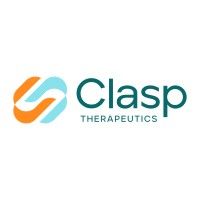预约演示
更新于:2025-05-07

Clasp Therapeutics, Inc.
更新于:2025-05-07
概览
标签
内分泌与代谢疾病
呼吸系统疾病
消化系统疾病
双特异性T细胞结合器
疾病领域得分
一眼洞穿机构专注的疾病领域
暂无数据
技术平台
公司药物应用最多的技术
暂无数据
靶点
公司最常开发的靶点
暂无数据
| 排名前五的药物类型 | 数量 |
|---|---|
| 双特异性T细胞结合器 | 1 |
| 排名前五的靶点 | 数量 |
|---|---|
| CD3 x p53 R175H | 1 |
关联
1
项与 Clasp Therapeutics, Inc. 相关的药物作用机制 CD3刺激剂 [+1] |
非在研适应症- |
最高研发阶段临床1期 |
首次获批国家/地区- |
首次获批日期- |
1
项与 Clasp Therapeutics, Inc. 相关的临床试验NCT06778863
GUARDIAN-101: A Phase 1 Dose Escalation and Expansion Study of CLSP-1025 in Adult Patients With Solid Tumors That Harbor the p53 R175H Mutation
Phase 1 dose escalation and expansion study of CLSP-1025, a first-in-class HLA-A*02:01 specific T cell engager (TCE) targeting solid tumors that harbor the p53 R175H mutation.
开始日期2025-02-28 |
申办/合作机构 |
100 项与 Clasp Therapeutics, Inc. 相关的临床结果
登录后查看更多信息
0 项与 Clasp Therapeutics, Inc. 相关的专利(医药)
登录后查看更多信息
1
项与 Clasp Therapeutics, Inc. 相关的文献(医药)2025-04-21·Cancer Research
Abstract 1126: CLSP-1025, a first-in-class precision T cell engager for the treatment of p53 mutant cancers
作者: Caushi, Justina X. ; Dobrev, Veselin S. ; Stokes, Kate L. ; Maloney, Michael F. ; Souza, Catherine ; McEachern, Kristen ; Kingsbury, Gillian A. ; Copeland, Ronald ; DeSander, Julie ; Shepherd, Julia ; Devens, Shannon ; Cullen, Lenore ; Suri, Vipin ; Orlando, David ; Bingham, James B. ; Andrews, Alec R. ; Underwood, Stuart A. ; Ford, Amanda ; Gizzi, Anthony S. ; Harshman, Lauren C. ; Krapfl, Kaleigh ; Siok, Madison Curtis
6
项与 Clasp Therapeutics, Inc. 相关的新闻(医药)2025-04-28
CAMBRIDGE, MA and ROCKVILLE, MD, USA I
April 28, 2025 I
Clasp Therapeutics, a biotechnology company bringing unparalleled precision to immuno-oncology with next-generation T-cell engagers (TCEs), today announced
new data
supporting the development of its lead program, CLSP-1025. Nonclinical data underpinning the GUARDIAN-101 Phase 1 study of CLSP-1025 were presented at the 2025 American Association for Cancer Research (AACR) Annual Meeting in Chicago, IL on April 27, 2025.
Clasp’s approach centers on developing precision TCEs with absolute tumor specificity by targeting oncogenic driver mutations presented by human leukocyte antigen (HLA) on cancer cells. CLSP-1025 exemplifies this strategy, selectively engaging the p53 R175H mutant peptide, presented by HLA-A*02:01, to direct a potent T cell response. Given that p53 is frequently mutated in cancer—with R175H as its most common variant—and HLA-A*02:01 is highly prevalent in the US, Europe, and Asia, CLSP-1025 has broad clinical potential.
The promising nonclinical data presented at AACR support the clinical development of CLSP-1025 as a potentially transformative therapy designed to deliver durable anti-tumor responses while minimizing impact on healthy tissue. As the first clinical-stage TCE to target an oncogenic driver mutation, CLSP-1025 is currently being evaluated in the GUARDIAN-101 Phase 1 clinical trial. This study is assessing the safety, pharmacokinetics, pharmacodynamics, and preliminary antitumor activity of CLSP-1025 in HLA-A*02:01–positive patients with advanced solid tumors harboring the p53 R175H mutation.
“At Clasp, we’re pioneering a new era of precision immuno-oncology – one that goes straight to the source by targeting the mutations that drive cancer formation and progression,” said Vipin Suri, Ph.D., Chief Scientific Officer of Clasp Therapeutics. “The nonclinical data we presented reinforce the promise of our approach and the potential of CLSP-1025 in the GUARDIAN-101 Phase 1 trial. These data mark a meaningful step forward in our mission to deliver targeted, more effective therapies for patients with limited options.”
Data Highlights:
About GUARDIAN-101 and CLSP-1025
Clasp’s Phase 1 GUARDIAN-101 dose escalation study evaluates the safety and initial anti-tumor activity of CLSP-1025. CLSP-1025 is a bispecific antibody-like molecule that directs a patient’s T cells to the tumor, generating a precise immune response to selectively and potently eliminate cancer cells. CLSP-1025 is designed to target the p53 R175H peptide in the context of HLA-A*02:01. Enrolled patients must be HLA-A*02:01 positive and have an advanced solid tumor that harbors the p53 R175H mutation. This Phase 1 study will identify the dose of CLSP-1025 for use in future studies. Visit
clinicaltrials.gov
(NCT06778863) for more details.
About Clasp Therapeutics, Inc.
Clasp is pioneering precision in immuno-oncology through next-generation T-cell engagers (TCEs) that target tumor-specific oncogenic driver mutations common across hard-to-treat cancers. Clasp’s platform identifies mutation-associated neoantigens and develops TCEs that can selectively bind HLA (human leukocyte antigen)-presented peptides derived from these oncogenic drivers. With their unique properties, Clasp’s TCEs are adaptable for application across a variety of cancers with high unmet need. Please visit
www.clasptx.com
to learn more.
SOURCE:
Clasp Therapeutics
临床1期AACR会议
2024-11-07
CAMBRIDGE, MA. & ROCKVILLE, MD.--(
BUSINESS WIRE
)--Clasp Therapeutics, a biotechnology company bringing unparalleled precision to immuno-oncology using next-generation TCEs, today announced new data validating the potential of its lead program, CLSP-1025. CLSP-1025 is a half-life extended TCE targeting cancer cells expressing the p53
R175H
mutant peptide presented by HLA-A*02:01. Data demonstrating the therapeutic potential of CLSP-1025 will be
presented
at the Society for Immunotherapy of Cancer’s (SITC) 39th Annual Meeting on November 8, 2024.
Clasp’s innovative approach focuses on developing TCEs with absolute tumor specificity (i.e., no anticipated off-tumor binding) by targeting shared cancer neoantigens derived from oncogenic driver mutations presented by human leukocyte antigen (HLA) on cancer cells. The company’s proprietary pHLAre™ platform mimics the natural immune synapse by bridging cancer cells and T cells through CD3 binding. This engagement activates T cells, resulting in potent targeting and destruction of cancer cells. CLSP-1025 targets the p53
R175H
mutation, which is prevalent in a range of solid tumors such as colorectal, esophageal, gastric, gynecological, lung, pancreatic and prostate cancers.
Together, Clasp’s data support advancing CLSP-1025 into clinical trials. CLSP-1025 is expected to be the first TCE targeting a shared cancer neoantigen to reach the clinic, with the first-in-human trial anticipated to begin in early 2025.
“Clasp was built to bring absolute precision to the power of immunotherapies, thereby improving and extending the lives of people with cancer,” said Chief Executive Officer Rob Ross, M.D. “Building on this promising preclinical data, we look forward to advancing CLSP-1025 into the clinic. Today’s presentation marks a significant milestone in our mission to deliver a new class of precision TCEs that expand the reach of immunotherapy.”
Data Highlights:
Selectivity
: CLSP-1025 demonstrates high selectivity for p53
R175H
presented on HLA-A*02:01
Specifically binds the R175H mutant peptide and spares wildtype p53;
No reactivity with any other human peptides presented on HLA-A*02:01;
Sensitivity
: CLSP-1025 activates T cells and effectively kills patient-derived organoids, demonstrating activity at endogenous target expression levels;
Activity
: CLSP-1025 induces the regression of established tumors
in vivo
.
About Clasp Therapeutics, Inc.
Clasp is pioneering precision in immuno-oncology through next-generation T cell engagers (TCEs) that target tumor-specific oncogenic driver mutations common across hard-to-treat cancers. Clasp’s platform identifies mutation-associated neoantigens and develops TCEs that can selectively bind HLA (human leukocyte antigen)-presented peptides derived from these oncogenic drivers. These innovative pHLAre
TM
molecules, precise HLA redirecting engagers, direct all T cell types to destroy the tumor. With their unique properties, Clasp’s TCEs are adaptable for application across a variety of cancers with high unmet need. Please visit
www.clasptx.com
to learn more.
免疫疗法AACR会议临床研究
2024-10-04
CAMBRIDGE, MA. & ROCKVILLE, MD.--(BUSINESS WIRE)--Clasp Therapeutics, a biotechnology company bringing unparalleled precision to immuno-oncology using next-generation T cell engagers (TCEs), today announced it will present comprehensive preclinical data demonstrating the selectivity and activity of CLSP-1025, a TCE targeting a common p53 mutation, at the 2024 Annual Meeting of the Society for Immunotherapy of Cancer (SITC), being held November 8 - 10, 2024 in Houston, Texas and virtually.
Presentation Details:
Title:
CLSP-1025, a novel bispecific T cell engager targeting a p53 R175H mutant peptide presented by HLA-A*02:01
Presentation Type:
Poster
Abstract Number:
1061
Date and Time:
Friday, November 8, 2024, at 9 a.m. CT – 7 p.m. CT
Location:
Exhibit Halls AB, George R. Brown Convention Center in Houston, TX
Presenters:
Justina X Caushi, Alec R Andrews, James Bingham, Lenore Cullen, Anthony S Gizzi, Gillian A Kingsbury, Kaleigh Krapfl, Madison Curtis Siok, Catherine Souza, Kate Stokes and Michael F Maloney
About Clasp Therapeutics, Inc.
Clasp is pioneering precision in immuno-oncology through next-generation T cell engagers (TCEs) that target tumor-specific oncogenic driver mutations common across hard-to-treat cancers. Clasp’s platform identifies mutation-associated neoantigens and develops TCEs that can selectively bind HLA (human leukocyte antigen)-presented peptides derived from these oncogenic drivers. These innovative pHLAre
TM
molecules, precise HLA redirecting engagers, direct all T cell types to destroy the tumor. With their unique properties, Clasp’s TCEs are adaptable for application across a variety of cancers with high unmet need. Please visit
to learn more.
Contacts
Media:
Michael Galfetti
Ten Bridge Communications
757-759-2576
mgalfetti@tenbridgecommunications.com
免疫疗法临床研究AACR会议
100 项与 Clasp Therapeutics, Inc. 相关的药物交易
登录后查看更多信息
100 项与 Clasp Therapeutics, Inc. 相关的转化医学
登录后查看更多信息
组织架构
使用我们的机构树数据加速您的研究。
登录
或

管线布局
2026年03月01日管线快照
管线布局中药物为当前组织机构及其子机构作为药物机构进行统计,早期临床1期并入临床1期,临床1/2期并入临床2期,临床2/3期并入临床3期
临床1期
1
登录后查看更多信息
当前项目
| 药物(靶点) | 适应症 | 全球最高研发状态 |
|---|---|---|
CLSP-1025 ( CD3 x p53 R175H ) | 乳腺癌 更多 | 临床1期 |
登录后查看更多信息
药物交易
使用我们的药物交易数据加速您的研究。
登录
或

转化医学
使用我们的转化医学数据加速您的研究。
登录
或

营收
使用 Synapse 探索超过 36 万个组织的财务状况。
登录
或

科研基金(NIH)
访问超过 200 万项资助和基金信息,以提升您的研究之旅。
登录
或

投资
深入了解从初创企业到成熟企业的最新公司投资动态。
登录
或

融资
发掘融资趋势以验证和推进您的投资机会。
登录
或

生物医药百科问答
全新生物医药AI Agent 覆盖科研全链路,让突破性发现快人一步
立即开始免费试用!
智慧芽新药情报库是智慧芽专为生命科学人士构建的基于AI的创新药情报平台,助您全方位提升您的研发与决策效率。
立即开始数据试用!
智慧芽新药库数据也通过智慧芽数据服务平台,以API或者数据包形式对外开放,助您更加充分利用智慧芽新药情报信息。
生物序列数据库
生物药研发创新
免费使用
化学结构数据库
小分子化药研发创新
免费使用
